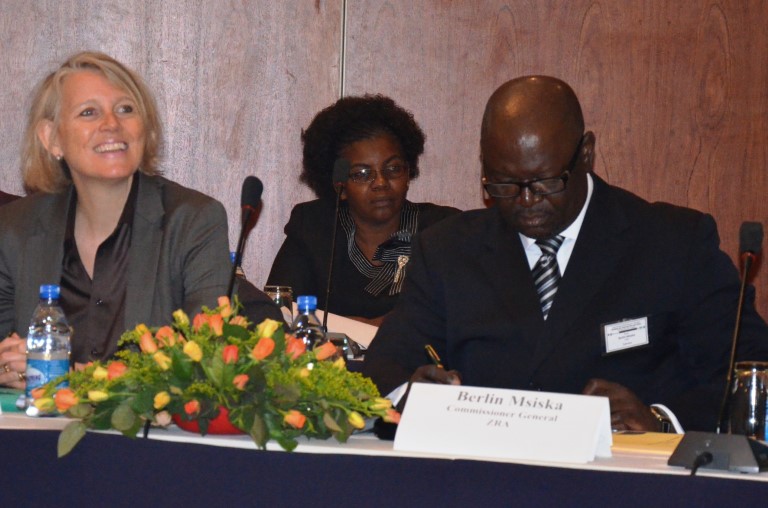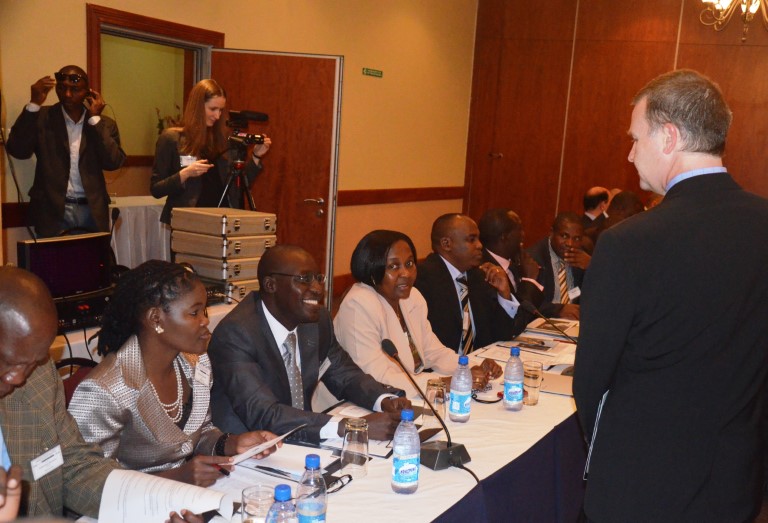Report from regional tax workshop in Lusaka

The workshop was organized by the Norwegian Agency for Development Cooperation (Norad) in partnership with the Norwegian Embassy in Lusaka and the International Centre for Tax and Development (ICTD).
The purpose was to discuss how tax authorities in developing countries can take steps to increase domestic revenues through more effective natural resource taxation and by enhancing tax morale.
Natural resource taxation
The workshop was opened by the Norwegian Ambassador to Zambia, Mr. Arve Ofstad, who moderated the session dedicated to the interface between tax policy and administration with regard to natural resource taxation. The first presentation was held by Commissioner General of the Zambia Revenue Authority (ZRA), Mr. Berlin Msiska, who gave an outline of recent administrative and policy reforms related to the mining tax regime in Zambia. While a number of steps have been taken to respond to challenges in the mining sector, ZRA is still confronted with a number of challenges, such as the possible undervaluation of minerals that are not internationally traded, transfer pricing, thin capitalization and hedging. The Commissioner General was followed by Director General of Norad, Ms. Villa Kulild, who presented the Norwegian experiences with natural resource management (see more below).
Representatives from the Tanzania Revenue Authority (TRA) and the Revenue Authority of Mozambique (AT) recounted the experiences with taxation of natural resources in their respective countries. A common challenge for the tax administrations in Mozambique, Tanzania and Zambia is the limited capacity to control the multinational companies that operate in their countries. To respond to this and other challenges, the institutional cooperation between the Norwegian Tax Administration and the revenue authorities in these three countries aims to increase capacity within the revenue administration, particularly with regard to audit capacity.
Tax experts from the IMF and Econ Pöyry stimulated a debate around how to most effectively design systems for natural resource taxation in countries with little capacity in the tax administration. The approach recommended by the IMF was to have a fixed, moderate royalty, a corporate income tax with resource specific rules, and an additional rent capture mechanism based on profitability measure. This was challenged by Mr. Aarsnes from Econ Pöyry, who argued that by following these recommendations, countries will end up with too few tax mechanisms to manage the particular challenges they are confronted with. Mr. Aarsnes further warned that trade in derivatives and hedging will be the most significant challenges for tax administrations in the years to come. There were also discussions regarding government ownership. Country examples such as Norway, Chile and Botswana seem to indicate that government ownership can secure a fair government take.
The delegates from South Africa and Botswana presented the mining tax regimes in their respective countries. The different approaches chosen by South Africa and Botswana presented a useful comparative perspective on mining tax regimes. Finally, a representative from the Tanzania Mineral Audit Agency (TMAA) gave a presentation on experiences with physical audits in Tanzania. Tanzania is the only country in the region that has a specific agency dedicated to executing physical audits of the quantity and quality of minerals production. The experiences from Tanzania were of great interest to the participants from the neighboring mineral-rich countries.

The Norwegian experience
Norad Director General, Ms. Villa Kulild, recounted the Norwegian experiences with managing natural resources, focusing particularly on the petroleum sector. The Director General gave particular importance to a few principles that have shaped the Norwegian approach to managing natural resources, such as the fundamental principle that a country’s natural resources are owned by its citizens and must be managed to their benefit.
Referring to the experiences from the early days of petroleum exploration on the Norwegian continental shelf, Ms. Kulild emphasized a few core questions that need to be addressed in the early stages of exploration. These include: what is the resource base, who owns the resources, how should the awarding of licenses be regulated and what is the best way to secure government take. She further underlined the importance of “making the pie as large as possible” over time, which demands a long-term and holistic approach to natural resource management. Stability and predictability, illustrated by the equal tax treatment of companies over time, are other principles that have played an important role in the Norwegian model of natural resource management.
The Director General noted that companies operating in the petroleum and minerals sectors are usually large, multinational companies with highly skilled staff and lawyers. Given this reality, it is important that resource rich countries make sure that they have adequate resources in place to manage the countries’ interests in negotiations with the companies. Ms. Kulild gave an example from Norway in the 1990s, when the international petroleum companies put pressure on the government to reduce the special petroleum tax (a 50% tax which is added to the ordinary corporate tax rate of 28%), arguing that the oil prices were too low to make a profit. The government resisted the pressure and responded by facilitating access for more international actors on the Norwegian continental shelf, thereby increasing competition.
Ms. Kulild ended her presentation by emphasizing that the most important measure of corporate social responsibility is taxpaying.
Tax morale
The second day of the workshop, moderated by Mr. Jean Moueli from the African Tax Administrations Forum (ATAF), was dedicated to the central question of how to build a taxpayer culture. The session was kicked off [opened] by the presentation of a study entitled ‘Building taxpayer cultures in Mozambique, Tanzania and Zambia: Achievements, challenges and recommendations for Norwegian support”, undertaken by CMI. Dr. Odd-Helge Fjeldstad focused his presentation of the study on concrete steps that can be taken to increase tax moral in the countries of concern. One issue identified as a common obstacle to tax moral in many countries, was the common practice of providing tax exemptions to companies to attract investments. This practice contributes to reducing tax moral among ordinary tax payers – when the large tax payers don’t pay their taxes, ordinary citizens don’t feel like they need to either. This view was supported by Mr. Fredrik Aksnes from the Norwegian Tax Administration in his presentation.
However, according to analyses done by the Tanzania Revenue Authority (TRA), tax incentives are not a decisive factor for a company’s investment decision. Tax exemptions are rather the ‘dessert after the meal’. As such, tax exemptions can be eliminated without necessarily influencing the investment climate in the countries. Mr. Adolf Ndunguru from TRA called for more cooperation among neighboring countries like Mozambique, Tanzania and Zambia on this matter.
Mr. Moises Marrime from the Autoritade de Mozambique (AT) gave an overview of recent efforts to improve large taxpayer compliance in Mozambique. These efforts include the establishment of a database for monitoring large taxpayers and special audits.
The session was wrapped up by Mr. Savior Mwambwa from the civil society organization ‘Zambia Tax Platform’, who called for increased stakeholder engagement and public debate on matters of natural resource taxation and tax morale in developing countries.
